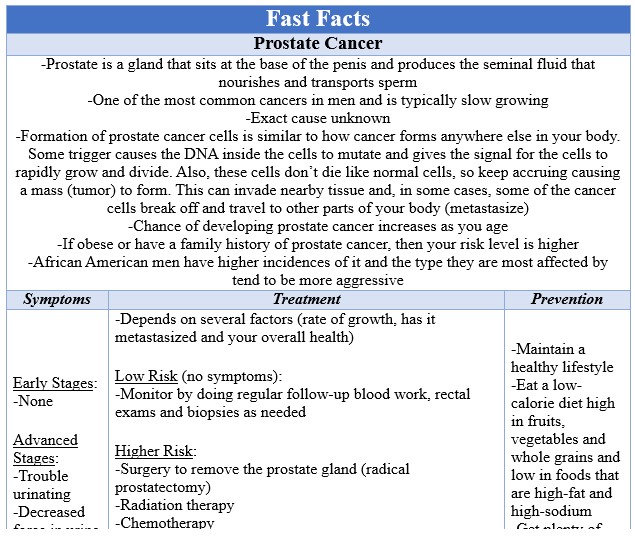Should you be concerned?
Due to the numerous commercials advertising medications to help men with prostate issues, most people know that it can cause problems, such as the urge to urinate frequently or making it difficulty to urinate. However, the condition that would be most concerning is hardly mentioned. What condition is this? How is it treated? Is there a way to prevent it?
 Definition
Definition
Prostate cancer is when cancer cells grow within the prostate, which is a gland that sits at the base of the penis and produces the seminal fluid that nourishes and transports sperm. It is one of the most common cancers in men and is typically slow growing. While the exact cause is unknown, the formation of cancer cells is similar to how cancer forms anywhere in your body. Some trigger causes the DNA inside the cells to mutate giving the signal for them to rapidly grow and divide. Also, these cells don’t die like normal cells, so keep accruing causing a mass (tumor) to form. This can invade nearby tissue and, in some cases, some of the cancer cells break off and travel to other parts of your body (metastasize). Your chances of developing prostate cancer increase as you age. If you are obese or have a family history of prostate cancer, then your risk level is higher. Also, African American men have higher incidences of it and, unfortunately, the type they are most affected by tends to be more aggressive.
There are no symptoms during the early stages of prostate cancer. Sadly, it isn’t until it has reached advanced stages that symptoms become noticeable. These can include trouble urinating, decreased force in urine stream, blood in your semen, discomfort in your pelvic area, pain in your bones and erectile dysfunction. If prostate cancer is discovered early, before it has metastasized, then it has a better chance at being treated.
Treatment
The treatment for prostate cancer depends on several factors, like the rate of growth, has it metastasized and your overall health. If your doctor considers you to be at low risk (your cancer isn’t causing any symptoms), they may recommend keeping an eye on it by doing regular follow-up blood work, rectal exams and biopsies as needed. If this is not an option for you, your doctor may recommend surgery to remove the prostate gland (radical prostatectomy), radiation therapy or chemotherapy. Another possible option is hormone therapy, which focuses on inhibiting testosterone (prostate cancers cells need this to grow). There are two types of medications that can lower your testosterone level. One type stops your body from producing it and the other blocks it from reaching the cancer cells. A non-pharmaceutical option to lower your testosterone level is to have your testicles surgically removed (orchiectomy). Sometimes, a procedure called cryosurgery or cryoablation is performed, this is when the cancer cells are killed by freezing them using a very cold gas placed via a needle into the surrounding tissue followed by a second gas to reheat the tissue. This cycle causes damage to the cancer cells, eventually killing them. A procedure used to treat advanced and recurring prostate cancer is biological therapy. This involves taking some of your immune cells, modifying them to fight the cancer cells in a laboratory and then injecting them back into your body. Since there are so many treatment options available, your doctor will help guide you through the decision-making process of which one is best for you.
Prevention
The best way to prevent prostate cancer is by maintaining a healthy lifestyle. This should include eating a low-calorie diet that is high in fruits, vegetables and whole grains and low in foods that are high-fat and high-sodium. By doing this, you will receive the vitamins and minerals that your body needs from diet rather than trying to replace them by using supplements. Since supplements haven’t been proven to reduce the risk of prostate cancer, it is vital to get them from your diet. Another element is to get plenty of exercise. Not only does this help you to maintain a healthy weight, but there has been some evidence that men who exercise have lower PSA (Prostate-Specific Antigen) level. This is a substance that is normally found in your blood stream, but can be elevated if something is wrong, not just cancer, with your prostate. If you are at high risk for prostate cancer, your doctor may recommend taking medications to reduce this risk.
Prostate cancer is life-altering diagnosis, but it can be treated successfully. If you have any questions or concerns, please speak with your doctor. If you would like more information, please visit the American Cancer Society’s Prostate Cancer page at https://www.cancer.org/cancer/prostate-cancer.html